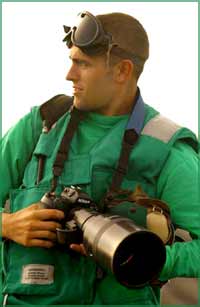| 
 That wreck isn’t the only famous drag racing mishap
that Mark Rebilas has caught on film. Remember the blow-over
of the late Gary Ormsby’s Top Fueler during a testing
session at Firebird Raceway in Arizona in 1991? Rebilas got
that one too, and his images made every newspaper and magazine
interested in drag racing, from National Dragster to (R.I.P.)
Super Stock & Drag Illustrated to Car & Driver, and
eventually to the media world-wide. That wreck isn’t the only famous drag racing mishap
that Mark Rebilas has caught on film. Remember the blow-over
of the late Gary Ormsby’s Top Fueler during a testing
session at Firebird Raceway in Arizona in 1991? Rebilas got
that one too, and his images made every newspaper and magazine
interested in drag racing, from National Dragster to (R.I.P.)
Super Stock & Drag Illustrated to Car & Driver, and
eventually to the media world-wide.
Rebilas was 11 years old then, standing atop a milk crate
at half-track in the grandstands with camera in hand, on orders
from his father, Gil Rebilas. “He gave me the camera,
taped the lens to the body so I wouldn’t lose the focus,
and said not to move from that spot,” Mark says. He
got his shot of Ormsby, and the rest, to both Rebilases, at
least, is history.
Mark has been shooting drag racing for the past 15 years.
Father Gil, of Mesa, Arizona, has been a racing photog for
the past 40 years, and his name is as well-known in drag racing
as any of the Top five straightline shooters nationwide.
“He was my inspiration. When I was young, that’s
all that I wanted to do, get the shot so we could make the
money,” Mark says of dad. He would go to five or six
national events with his father, but on nearly every other
weekend, he would be shooting something, whether it was drag
racing, go-kart racing, motorcycles, drag boats or anything
and everything in between.
Today, Mark Rebilas, who calls Port Orchard, Washington,
home, has a year to go on his enlistment in the U.S. Navy.
He is now stationed in port in Bremerton, about 25 minutes
from Seattle, aboard the nuclear-powered carrier the U.S.S.
John C. Stennis. He and his shipmates just finished a five-month
deployment overseas, “hanging out,” he says, “off
South Korea because there was a lot of tension there.”
The Stennis also sailed near Canada to Hawaii to Japan, Malaysia
and to Australia. She is now undergoing a 10-year-maintenance
overhaul.
Rebilas, 25, says he felt obligated to join the navy right
after 9-11. “I just felt like, after 9-11, I had to
do something. It was pretty much war time, and a lot of photographers
want to be able to shoot war time stuff, so I joined the navy,”
he says. He spent his first year washing airplanes. It was
only after telling his higher-ups, after showing them some
of his photography work, that Rebilas convinced them to switch
his job description over to a naval photographer --- the correct
term is “Photographer’s Mate, Third Class.”
He is a documentarian, taking photos of the day-to-day activities
of the ship, from carrier landings and take-offs to visits
by V.I.P.s. The photos are sent to the Pentagon and are eventually
disseminated to the world-wide media. He is one of a group
of 22 whose job description involves photography, but one
of only four others who take photos exclusively.
His camera and lenses, Mark says, cost more than his car.
He takes photos daily, devoted to the navy on weekdays and
racing when possible on the weekends.
The younger Rebilas’ terrifying shot of the Krisher
crash is but his most recent. “All my memories are around
drag racing,” he says. “I grew up at the track.
A race track is home to me.” Lately he has been focusing
--- literally and figuratively --- on NASCAR and other roundy-round
events, including the Daytona 500, the Indy 500, plus being
under contract for Dale Earnhardt Inc., plus a lot of pro
sports like Major League Baseball, the National Football League
and even a college championship game or two.
The Krisher crash was but one of hundreds of such on-track
mishaps, most on the top end. “It takes a lot of skill
and reaction time to capture action that goes wrong, because
you can’t plan on that,” Rebilas says. “You
have to stand there and get that shot. You can’t be
running when you’re a photographer. It’s a very
dangerous job, but I sign a waiver before I go to the track,
so I know what I’m getting myself into.”
The future for Mark Rebilas? Out of the navy in a year, some
college classes, and then more shooting. “It’s
my life. It’s all I care about,” he says. He wants
to stay with racing --- any kind. “That’s my passion.
NHRA, NASCAR, Indy racing, I just want to shoot racing,”
he says.
He praises his father, Gil. After all, he has been shooting
with him all his life. “Few people can do what they
love and get paid for it, and I have that opportunity, and
I’m not going to waste it,” Mark says. “My
father set a pretty high standard for me, and I’ve been
perfecting my craft, and lately it’s been pretty cool
that my dad gets to brag about me to his friends. When I was
younger, I’d be bragging about my dad to my friends.
So everything has gone full circle.” 
|

